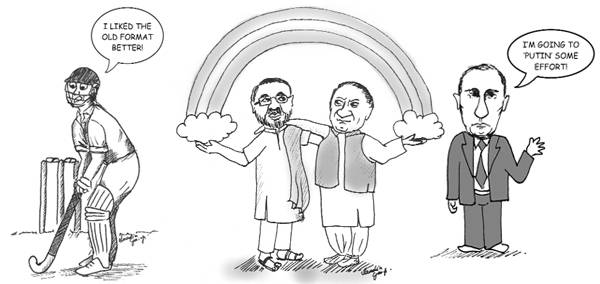
Divide and rule
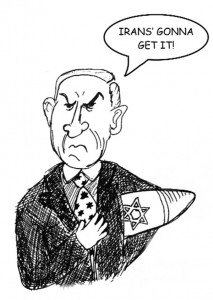
Sir,
All it took a small country like UK to establish its colonial empire across the globe was to exploit internal squabbles, divide people, and weaken them militarily by creating an environment for deadly battles between various tribes on ethnic, religious or linguistic issues and move in to establish their hold. This divide-and-rule policy has been adopted by every nation with ambitions for territorial expansion or strengthening their economic stronghold over countries with abundance of natural wealth, but lacking in human resource development and the capacity to defend themselves.
Any Arab Muslim country with the potential for developing its human resources is today a victim of engineered internal strife, divided across sectarian or tribal lines. Iraq, Libya and Syria, once ruled by comparatively moderate regimes with hopes and ambitions of Arab solidarity, now stand destroyed through intrigue. The vacuum created by their collapse has been filled by ISIS.
Is it a coincidence that Israel and the Saudi monarchy have both embarked on an offensive to isolate Iran economically and militarily, deprive it of its right to develop its nuclear capability for peaceful use, when Israel possesses a huge stockpile of nuclear weapons and missile technology to deliver them, with an unmatched conventional weapons superiority in quantity and technological superiority compared to the rest of Arab world. No religion, including Jewish faith, justifies annihilation of unarmed civilians in Gaza, or occupation of Arab land through preemptive attacks justifying them as anticipatory self defense.
Tariq Ali,
Lahore.
Good books

Sir,
This refers to your coverage of the Lahore Literature Festival (TFT February 27-March 5), which concluded on Sunday, February 22, with a message to the world in general, and to the extremist and the terrorist groups in particular, that we as a nation are people of art and culture, and are rich in literature, with authors of international repute.
The large presence of the young generation was an eye opener for those who are bent upon destroying the cultural heritage of our country. Our youth rejects all sorts of extremisms and are full of hope with a clear vision of an educated, peaceful and nonviolent Pakistan.
The organizers of the festival deserve applause and appreciation from all segments of the society. It was a gathering of not only the people of pen but from all walks of life, old and young, highly educated and less educated, boys and girls – in short, it attracted the entire nation.
Although it was the third event of its kind in Lahore, the organizers took the challenge to provide the people of Lahore an opportunity to mingle with authors, artists, and people from the show business, and to buy books of their choice at reduced rates, in the best possible environment.
The discussions by the eminent authors covered almost every subject, from the tragic event of fall of Dacca, to melody queen Noor Jahan, and the great mountains of Pakistan. The launch of book “The Colonel Who Would Not Repent” by Salil Tripathi – on the events of 1971 – was attended by a packed hall of Alhamra auditorium, clearly indicating the sentiments of the people of Pakistan. It was heartening to hear words of apology from a vast audience, and the session also witnessed some rumbling of discount on the stories of rape and atrocities. Ms Sadaf Siddiqui, an eminent scholar from Bangladesh, was unable to satisfy the audience on the question of the atrocities committed by Mukti Bahini and the inhuman treatment being meted out to the Bihari community living in camps. The presence of a large number of people from all walks of life clearly indicated that the tragedy of 1971 is still fresh in the minds of people of both the countries – the tragedy that shook the very foundations of Pakistan, the tragedy that forced Faiz to wonder “Khoon Kay Dhabay Dulhain Gay Kitni Barsatoon Kay Bad” (How many rains will it take to wash the stains of blood?), the tragedy which was so deeply felt by Altaf Fatima, who wrote “Chalta Musafir”. Unfortunately, other than that we find almost no reference in Urdu fiction to that madness of 1971 that resulted in the separation of East Pakistan and the independence of Bangladesh. Most of what has been written on those events and the causes behind those blood-stained days of our history is by eminent academic scholars, retired armed forces personnel and bureaucrats, and journalists. The organizers of LLF are requested to cover this subject in a more detailed discussions in the next LLF. The absence of Altaf Fatima, the great Urdu fiction writer of both novels and short stories, was greatly felt by Urdu literature lovers.
The launch of a book by Naseeruddin Shah was also very well attended, which clearly indicates how the people of Pakistan value visitors from India and have love and affection for them. The hall was packed, with some audience even sitting on the stairs and standing at the rear, while an equal number of them waited outside in a long queue to get a chance to get into the hall.
Gen Nadeem Ahmed did full justice with the session “When A Woman and Mountain Meet” with Aisha Khan, but the capacity of Hall 5 in which the discussion was conducted was too small. Many anxious visitors had to miss such a lovely discussion on how one lady did wonders in the mountains of Pakistan with the help of Pakistan Army.
Most of the panel discussions were in English, even the one on the melody queen Noor Jahan. During the discussion, the panel – including two daughters of Noor Jahan – tried again and again to compare the greatest singer of southeast Asia with Lata Mangeshkar. That left a very bad taste, as Lata Ji is a great singer in her own style and manner and she has paid great tributes to the Melody Queen. Comparing the two great singers is simply an indication that we in Pakistan are living in a state of inferiority complex. It is expected from the organizers that in the future they will try to conduct the discussions in the national language, especially when discussing Urdu authors, poets, singers and artists. I also hope Urdu literature and the writers will get prominent coverage next year.
All in all, the LLF provided a pleasant change to the people of Lahore, who did full justice with the festival by turning up in great numbers.
Aamir Aqil,
Lahore.
Putin some effort
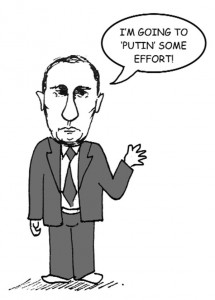
Sir,
Recently, I have read news reports that Russian President Vladimir Putin has cut his own salary, the earnings of the Prime Minister, and the salaries of a number of other high-ranking officials by 10 per cent, due to the economic hardships being experienced by the country.
Can we see that happening in Pakistan?
Babar Saeed,
Karachi.
Deterrence now
Sir,
The growing disparity and asymmetry in South Asia is favorable to India yet challenging for Pakistan. India’s rising nuclear and conventional ambitions have enforced Pakistan to build up its nuclear capabilities to ensure the credibility of its nuclear deterrence. Previously, India’s doctrinal transformation and ballistic missile defense capabilities which are rapidly maturing, have indulged Pakistan in miniaturization of warheads. Lately, the evolving South Asian regional security dynamics are coercing Pakistan to develop full spectrum credible minimum deterrence capability to deter all forms of aggression.
The recent successful test launch of Shaheen-III Surface to Surface Ballistic Missile on March 9th from the Southern coast off the Arabian Sea is an appropriate, requisite and well-timed response to India’s sophisticated and intensive ballistic missile and anti-missile developments. India on 19th February test-fired nuclear capable Prithvi-II missile hence a response from Pakistan was evident and essential to ensure that Islamabad has the capabilities to counter the intimidating advancement.
Deterrence, as precisely termed, is “the exploitation of a threat without implementing it, or exploiting the existence of weapons without activating them”. Consequently nuclear weapons are essentially supposed to be the weapons of peace and not war. However, the Indian arrogance to exploit conventional supremacy and regional hegemonic aspirations are evident from assorted course of actions. Regional stability has also been threatened after Modi government’s aggressive postures. Resultantly, the developing regional dynamics inflict Pakistan to convert credible minimum deterrence into full spectrum credible minimum deterrence.
The continuing race between Pakistan and India is of grave regional concern. Yet evidently, Islamabad is not seeking a nuclear parity with New-Dehli but compelled to exhibit a reaction in response to an action.
Maimuna Ashraf,
Islamabad.
At home
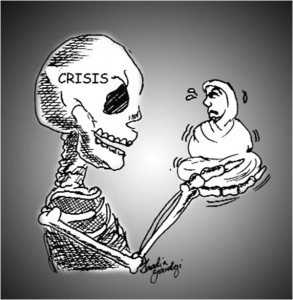
Sir,
It is hoped that the problems of Pakistan that are due to Afghan refugees would be tackled during 2015 in line with the National Action Plan. In this regard, it is proposed that the UNHCR should be persuaded to shift refugee camps in Pakistan to Afghanistan. It appears that such a feasible measure has not been taken so far due to lobbying by elements with vested interests.
Taraq Jazy,
Islamabad.
Review

Sir,
Cricket maestro Sachin Tendulkar has very rightly said that ICC should expand the next Cricket World Cup to 25 teams instead of reducing the numbers of teams in the World Cup. If 25 teams will feature in the Cricket World Cup then it will surely globalize cricket.
Tendulkar also gave the great idea that Test playing nations must send their A teams to associate cricket countries. This will help improve the quality of cricket internationally.
However, ICC wants the World Cup format to be like 1992, when all the nine teams played against each other before the semi-finals. It was an interesting format, but if the ICC goes back to it (it is thinking of 10 teams) the game will not be globalize.
If ICC wants to top teams to play against each other, then Champions Trophy can be played between the top five ranking teams, instead of the usual eight.
I hope that ICC will make an appropriate decision after considering all the options and discussing with former cricket greats, cricket boards and also with associate cricket playing nations.
Mubashir Mahmood,
Karachi.
War and peace
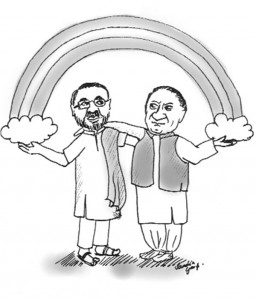
Sir,
Branding India as enemy number one of Pakistan seems to have become a prequalification to be a patriotic Pakistani. Scientific and logical argumentation has just no place in this equation. To settle our problems with India, we have always resorted to violence – although it is a historical reality that every time we got a bloody nose, and most of the times we took our defeats as victories.
Such a mindset framed through systematic brainwash exercise, spanned over many decades, was carried out by our extremist religious lobby. Our sub-standard political leadership, being opportunists, instead of countering the philosophy of religious bigots, followed like a passive horde. By the time the media got rid of its official shackles about fifteen years ago, the damage had already been done.
As a matter of principle, enmity is undesirable in all its forms and manifestations. But enmity with neighbors, particularly enmity with a neighbor five times your size, is simply suicidal.
First we have to get the India-Pakistan equation rationalized, to know who stands where. While indulging in such an exercise we have to evaluate the problem in philosophical rather than in diplomatic terms. In diplomacy, telling lies is not a big deal, while philosophy is not designed to accommodate falsehood.
In most of our major problems with India, Pakistan happens to be on the receiving end. In the case of Kashmir, history tells us that India blatantly usurped the major part of Kashmir by force, in utter disregard of the terms set by the British regarding the future status of princely states of the sub-continent. To resolve the problem Pakistan committed blunder over blunder and resorted to use of force, every now and then, to wrest the state from India. Needless to repeat the history of our follies, we come to the present. India is quite comfortable with the status quo. Pakistan is not. Regarding Siachin Pakistan is bending head over heels to withdraw its forces from the glacier, provided India does the same. India is indifferent and gives the impression that she is quite comfortable with the status quo. Pakistan is not.
Regarding water distribution of Indus basin in accordance with the terms of the Indus basin treaty, of which both India and Pakistan are signatories, again India is indifferent and is quite comfortable with the status quo. Pakistan is not. In the case of trade, despite the fact that the envisaged trade agreement if done, India will be in more advantageous position than Pakistan, but with a view to up the ante in other problems with Pakistan, India is once again indifferent and is comfortable with the status quo. Pakistan is not.
In the case of proxy engagements through terrorist tactics, India possesses a much bigger stomach than Pakistan and as such is quite content with the status quo. Due to the limited capacity of our stomach, Pakistan is not.
Prudence demands that Pakistani leadership, being on the receiving end, must adopt a conciliatory approach with India. National media, being the other main actor to reflect the national aspirations, must also assist the national leadership to succeed in achieving the national objectives. What is happening, on the contrary, that these state organs, to prove their credentials of patriotism, keep spitting fire against India. Thus, in the process, the national interest is being perpetually undermined.
Although I don’t place the entire onus of the mayhem on any of the two sides as both the parties are to blame, but Pakistan has shot itself in the foot and hurt its own cause.
While religious extremists were on a rampage, the political leadership kept clamoring about negotiations with the terrorists. With the arrival of the new army leadership, things changed. Although the genesis of India-Pakistan antagonism tells us that the policy was originally sponsored by the army leadership of the time and diligently maintained by successive leaderships, now when the discourse has materially changed, the national foreign policy about India must also change. As the recent army leadership has unequivocally made it clear, more than once, that the country’s security is threatened from within and not from outside, brightens the hope that the concept of rapprochement with India will also be facilitated by the army leadership, and the nation will be rid of the jingoism so far promoted by the country’s religious lobby.
A Rashid,
Rawalpindi.

